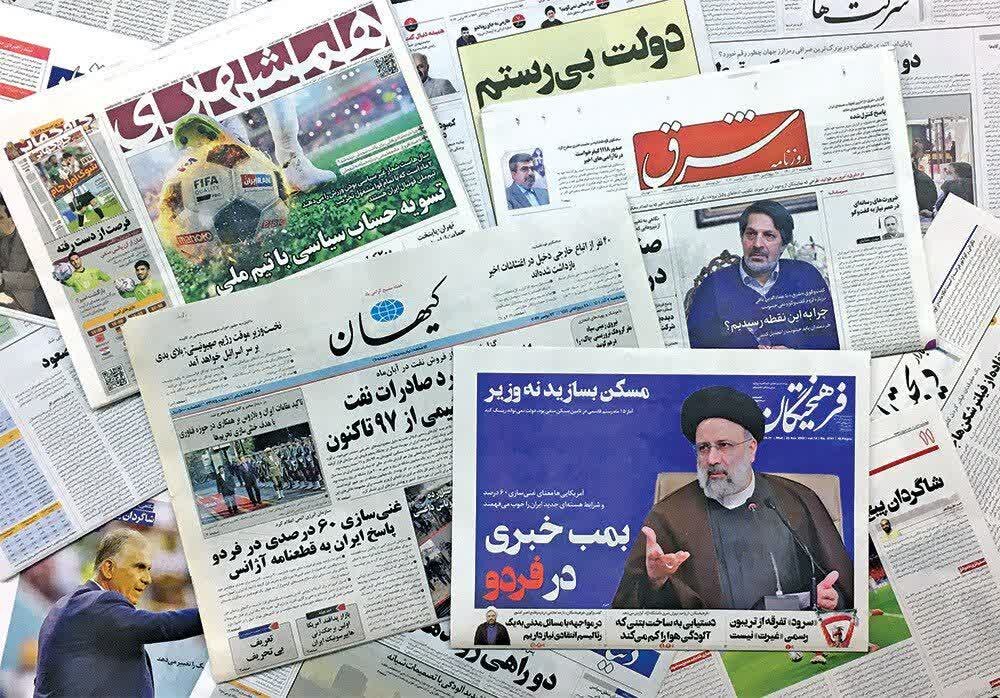Split in the opposition

In a commentary, the Javan newspaper analyzed the split among the opponents of the Islamic Republic and wrote: On Farvardin 14 (April 3), five anti-revolutionary political groups gathered in London to announce that their way is separate from the subversives living in America.
Before this split, the CIA had tried to unite different counter-revolutionary elements by holding two meetings in Georgetown and Stanford universities and writing a separatist booklet called the Mahsa Charter. Of course, it remained as a show. The Deutsche Welle website has reported that these five political groups have strongly criticized the Mahsa Charter in their press conference and accused the organizers of the Stanford University meeting. The Union of Republicans of Iran, the National Front of Iran-Europe, the Left Party of Iran (the terrorist group Fadayan Khalq), the organizations of the National Front of Iran, and the Solidarity of the Republicans of Iran are five political groups that, after rejecting the Mahsa Charter, have launched a new plan called “Hamgami”.
Etemad: Negotiation behind closed doors
In a note, Etemad pointed to news of a proposal by the United States for a temporary nuclear agreement with Iran. The columnist suggested: If Iran and the United States start negotiations directly with each other, they might be able to reach an agreement in some way. Of course, these negotiations should not be made public. Americans have concerns about military cooperation between Iran and Russia. Their opinion is that Russia provides Iran with weapons that upset the regional balance. As a result, if the negotiations between the two sides are conducted behind closed doors, it is possible to make compromises. The relationship between Iran and Russia is not supposed to be cut off completely, but there is a possibility that it will allay the concerns. In face-to-face negotiations, the concerns of the American side can be partially removed, especially on the conditions that Iran improves its relations with Saudi Arabia and the possibility of an agreement with the United States. I believe that face-to-face negotiations in closed rooms are much more effective than countries like Oman, the United Arab Emirates, and Qatar exchanging messages from time to time. You cannot achieve the desired result through mediation, and I believe that direct negotiations with America will lead to a more favorable result.
Kayhan: It cannot be negotiated
In its editorial, Kayhan refers to the solutions for the country’s problems. It said: The Islamic Republic, with its wonderful progress in military and defense technology, robbed military option from its enemy, the United States. Just a few days ago, a senior American military official announced that a military conflict with Iran is off the table. If the Islamic Republic wants to take the economic option from this felon enemy, it has no other way other than solving economic issues outside American influence– both domestic and foreign. Just as Iran could not remove the enemy’s military option from the military-security equations against itself by “negotiations with the US”, the approach of negotiating with the U.S. and the West cannot remove the lever of economic threats against itself from their agenda. The results of negotiations leading to the JCPOA are a true witness of this claim.
Iran: Israel’s confusion
The Iran newspaper discussed Israel’s reaction to Iran’s diplomatic moves and wrote: The process of Iran’s diplomatic developments in recent months has caused the Zionists to get confused. On the one hand, despite Iran’s historic progress in nuclear industry, the (IAEA) Board of Governors withdrew from the destructive process of issuing a political resolution against Iran. And on the other hand, Iran and Saudi Arabia reached an agreement to resume relations with each other and put a brake on the normalization of relations between some countries in the region with the Zionist regime. In addition to this, the news of OPEC+ reduction of oil production, which led to an increase in energy prices, as well as the verdict of the Hague Court in favor of Tehran in the case of Iran’s complaint against the United States regarding the theft of our country’s property, has angered the camp of Iran’s enemies. These events that most of them are the consequences of Iran’s active and intelligent diplomacy, have increased the struggle of the Zionists to change the game.
Ham Mihan: Tension between the two sides of the Aras River
The Ham Mihan newspaper analyzed the tensions between Baku and Tehran, saying: A significant issue in Iran’s relations with the Republic of Azerbaijan, which has become more public over the past 18 months, and Tehran has explicitly warned Baku about it, is the deepening of relations between this country with Tel Aviv. The large and public presence of Israeli companies in Azerbaijan and Baku’s decision to open embassy in Israel at a time when the country's relations with Iran were at the beginning of an unprecedented tension, caused the authorities in the Islamic Republic to react many times in their speeches to this decision. Finally, on Farvardin 9, 1402, (March 29, 2023) Israel’s Foreign Minister Eli Cohen wrote on his Twitter account: “Historical news!” Currently, I am hosting the Minister of Foreign Affairs of Azerbaijan in the Ministry of Foreign Affairs. During Jeyhun Bayramov’s visit to Israel, the country’s embassy was officially opened in Tel Aviv. Also, Eli Cohen’s words regarding the formation of a “United Front against Iran” during the meeting with his Azerbaijani counterpart drew reaction from Iran, and the spokesperson of the Ministry of Foreign Affairs of our country demanded an explanation from the authorities of the Republic of Azerbaijan (in this regard).
